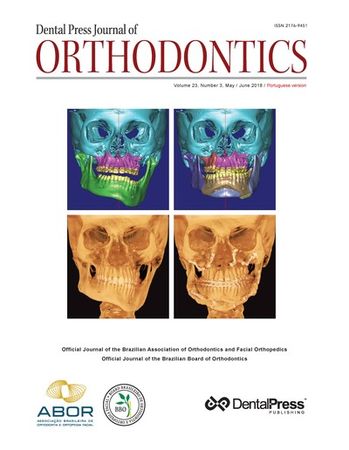

o objetivo deste estudo prospectivo foi comparar, usando imagens de TCFC, os efeitos tridimensionais da mola convencional de verticalização (CA) e da mola de verticalização com ancoragem em mini-implantes (MIA).
Leia mais

É possível unificar técnicas ortodônticas personalizadas e tecnologia de planejamento cirúrgico 3D. No presente relato de caso, apresenta-se um plano de tratamento envolvendo o uso de braquetes autoligáveis passivos personalizados e planejamento cirúrgico virtual, combinado com cirurgia ortognática de benefício antecipado, em um paciente com má oclusão de Classe III. Foram obtidos excelentes resultados faciais e oclusais em um tempo reduzido de tratamento, de 5 meses.
Leia mais

Rapid maxillary expansion is considered gold standard when correction of transverse maxillary deficiency is required. The gains from the expansion go far beyond just correcting dental transverse problems. Improvements in maxillary positioning, increased respiration, and even altered speech have already been scientifically proven. However, in order to obtain such results, this procedure should be performed before the adult phase of the patient, since over the years the suture will calcify,...
Leia mais
According to the Council of Science Editors1, the term “research misconduct” applies to any situation presenting either inadequate treatment of the individuals involved in the research or intentional manipulation of the scientific records so they will not reflect the truth. Even though this is fairly easy to conceptualize, it is often difficult to identify, especially in scientific publications.
Leia mais
It gives me great joy to interview this great European orthodontist. When I was starting my postgraduate training in Orthodontics in 2002, I got amazed when I read for the first time about autogenic transplantation of teeth in the anterior region. Although this approach is quite common in Europe, it is not a usual treatment option in Brazil. Later on, I got to know the papers published by Dr. Ewa Czochrowska and realized all the scientific background of this treatment protocol. She finished...
Leia mais
Florid cemento-osseous dysplasia is a sclerosing disease that affects the mandible, especially the alveolar process, and that is, in most cases, bilateral; however, in some cases it affects up to three or even four quadrants. During the disease, normal bone is replaced with a thinly formed, irregularly distributed tissue peppered with radiolucent areas of soft tissue. Newly formed bone does not seem to invade periodontal space, but, in several images, it is confused with the roots, without,...
Leia mais
Objective: The aim of this prospective study was to compare the three-dimensional effects of the conventional helical uprighting spring (CA) and the mini-implant assisted helical uprighting spring (MIA), using CBCT scans. Methods: Twenty patients with mesially tipped second mandibular molars were divided into two groups: CA group, in which 10 patients were treated using a conventional helical uprighting spring with conventional anchorage; and MIA group, in which 10 patients were treated...
Leia mais
In the current era of expedited orthodontics, among many clinicians, tertiary care hospitals and patients, surgery first orthognathic approach (SFOA) has gained popularity. The advantages of SFOA (face first approach) are the reduced overall treatment duration and the early improvement in facial esthetics. In SFOA, the absence of a presurgical phase allows surgery to be performed first, followed by comprehensive orthodontic treatment to achieve the desired occlusion. The basic concepts of...
Leia mais
Introduction: Tooth dilacerations are dental anomalies characterized by an abrupt deviation in the longitudinal axis of a tooth. They may occur either in the crown, between the crown and root, or in the root. Although not so common, impacted maxillary incisors exhibiting root dilaceration pose a diagnostic and treatment challenge to the clinician. Description: This case report describes the management of a horizontally impacted and dilacerated maxillary central incisor in a 12-year-old girl....
Leia mais
It is possible to unify three-dimensional customized orthodontic techniques and three-dimensional surgical technology. In this case report, it is introduced a treatment scheme consisting of passive self-ligation customized brackets and virtual surgical planning combined with the orthognathic surgery-first approach in a Class III malocclusion patient. Excellent facial and occlusal outcomes were obtained in a reduced treatment time of five months.
Leia mais
Objective: To identify the appropriate power level for electric welding of three commercial brands of nickel-titanium (NiTi) wires. Methods: Ninety pairs of 0.018-in and 0.017 × 0.025-in NiTi wires were divided into three groups according to their manufacturers — GI (Orthometric, Marília, Brazil), GII (3M OralCare, St. Paul, CA) and GIII (GAC,York, PA) — and welded by electrical resistance. Each group was divided into subgroups of 5 pairs of wires, in which welding was done with...
Leia mais
Objective: The aim of this study was to compare the skeletal, dental, and soft tissue effects of the Mandibular Protraction Appliance (MPA) application in adolescent and adult Class II malocclusion patients. Methods: The sample comprised the pretreatment and posttreatment lateral cephalograms of 39 subjects presenting Class II malocclusion treated with the MPA and fixed appliances. Sample was divided into two groups: Group 1 comprised 23 subjects (10 male; 13 female), at a mean pretreatment...
Leia mais
Objective: This cross-sectional observational study was designed to assess the biosafety conducts adopted by orthodontists, and possible differences regarding training time. Methods: Both the application of methods for sterilization/disinfection of instruments and materials, and the use of personal protective equipment (PPE) were collected through questionnaires via e-mail. Results: The questionnaires were answered by 90 orthodontists with a mean age of 37.19 ± 9.08 years and mean training...
Leia mais
Dentofacial deformities usually are surgically treated, and 3D virtual planning has been used to favor accurate outcomes. Cases reported in the present article show that orthognathic surgery carried out to correct facial asymmetries does not comprise only one treatment protocol. 3D virtual planning might be used for surgical planning, but it should also be used to diagnose the deformity, thus allowing for an analysis of the best-recommended possibilities for the orthodontic preparation that...
Leia maisCopyright © 1998 - 2022 DentalGO | Todos Direitos Reservados. DentalGO é uma marca Dental Press